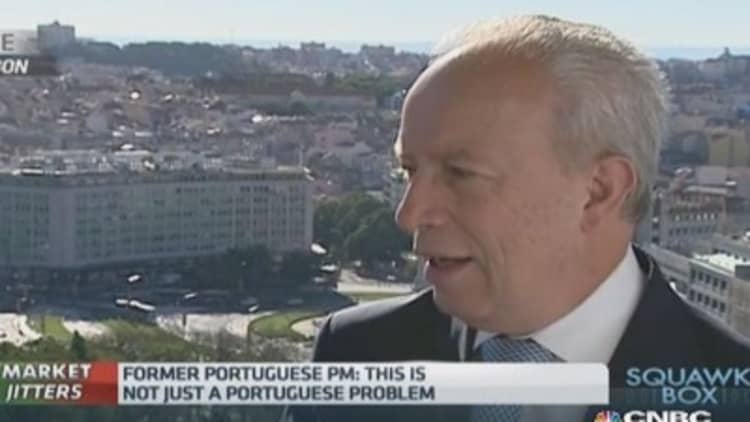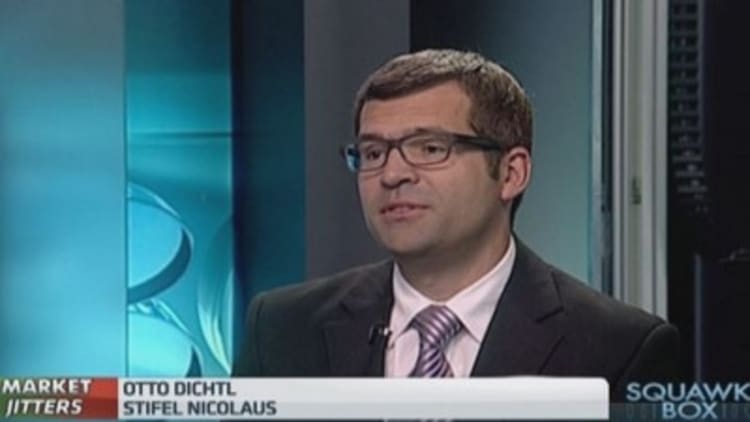
Banco Espirito Santo (BES), the troubled Portuguese lender that sparked a global market selloff Thursday, has rushed to quell any concerns regarding its financial stability – in spite of the problems in the complex structure of its parent company.
BES shares tanked 19 percent on Thursday before being suspended and a late-night press release hoped to cool fears ahead of Friday's market open with shares once again being held from trading.
The lender said that it had 2.1 billion euros of extra capital beyond the minimum that it is required to hold and tried to allay fears about its exposure to the rest of the complex structure of its holding company.
Read MoreHere's what's happening in Portugal
"(The) BES executive committee believes that the potential losses resulting from the exposure to Espirito Santo Group do not compromise the compliance with the regulatory capital requirements," it said in the release.
Portugal's Prime Minister, Pedro Passos Coelho, also tried to spread a reassuring tone, according to news wire reports, saying on Friday that investors should not worry about the stability of the country's financial system and BES depositors had no reason to worry.
Parent company Espirito Santo International (ESI) has sparked concerns surrounding its financial condition since an audit by the country's central bank in May. The troubles came to a head this week when debt repayments to clients on commercial paper issued by ESI were delayed.
Another part of the conglomerate, Espirito Santo Financial Group (ESFG) asked for its shares to be suspended due to "material difficulties" at ESI, which owns 49 percent of ESFG, which in turn owns 25 percent of the bank. Thus, the problems existing at its parent companies, and the exposure they each have, has caused problems lower down for the Portuguese lender.
Read MorePortugal concerns compound global stock selloff
Market regulator CMVM moved to protect BES on Friday, imposing a one-day temporary ban on the short selling of its stock. BES added Thursday evening that it is committed to not increase its total exposure to ESFG and is waiting for the release of the restructuring plan of EFSG in order to assess fully the potential losses it may have due to this exposure.
It also released an update on its exposure to other parts of the company, stating that they totaled 1.15 billion euros ($845 million) as of June 30. Analysts are almost unanimous in believing that this is very much a problem centered on this family of banking units and not a solvency issue.
Alberto Gallo, the head of European macro credit research at RBS, said that the potential losses it could make were easily covered by the capital buffer that it had detailed in the press release on Thursday evening.
Murky structure?
Analysts at BNP Paribas remained unconvinced by the statement. In a research note on Friday, BNP's Gildas Surry and Geoffroy de Pellegars said that the disclosure did not mention any exposure to one of its banking units based in Angola.
"We remain concerned by the magnitude of the impact of a default at ESFG as it could leave retail clients with significant losses," thew two analyst said.
"Added to the exposure of institutional clients, the impact on BES franchise could be detrimental with negative consequences on its funding capacity."
Regardless, the convoluted structure of the holding company - with parent parts of the group based in Luxembourg rather than Portugal - has many finding it hard to work out what contagion could potentially be involved. French bank Credit Agricole owns a 14.6 percent stake in BES, as well as investment firms like BlackRock and Bradesco.
Alan Higgins, U.K. chief investment officer at Coutts said that the company's structure could be regarded as being "very murky." Meanwhile, Pedro Santana Lopes, the former prime minister of Portugal, said that the officials behind the conglomerate would have a lot to answer to, especially to its shareholders.
He added that the government is likely to not get involved in resolving any issues and would not pay for what is happening. He also warned of a dangerous "intermezzo" at the bank with restructuring meaning any new board needs to act as soon as possible to bring trust and confidence back to the markets.
"Portugal will be solved, we'll get over it," he told CNBC Friday.
Global tremors
The problems at the bank, which in terms of assets is relatively small compared to the super-sized banks in the U.K, and the U.S., managed to send tremors around the globe. Portuguese sovereign yields crept higher along government debt from Greece, Spain and Italy.

Haven's like the and gold saw some buying as riskier assets like equities sunk lower. Giles Keating, the head of research at Credit Suisse Private Banking & Wealth Management believed that it was a perfect buying opportunity for stocks but was also a reason to sell fixed-income which could have become overbought in recent months.
Read MoreDoes Asia face Portugal-style debt risks?
Edward Hugh, an independent Barcelona-based economist told CNBC that the euro crisis wasn't back "just yet" but the latest revelations were a warning signal that one day it might be back.
"There's a growing concern about what's going to actually happen with this sovereign debt that's accumulated in southern Europe," he said.
Follow us on Twitter: @CNBCWorld



